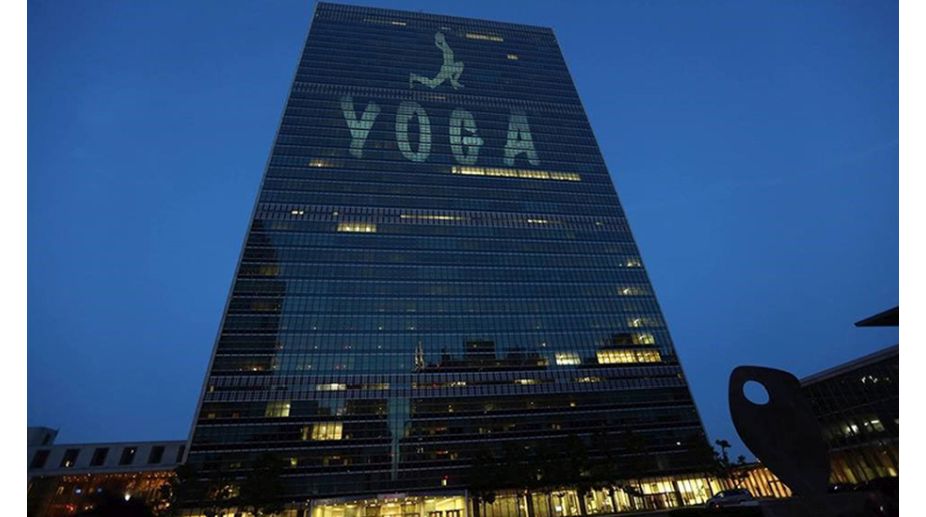Bank of Baroda celebrates International Day of Yoga
Bank of Baroda celebrated the International Day of Yoga across all its offices as part of its comprehensive BOB employee health and wellness framework.
At the United Nations headquarters, several events are being organised by India’s Permanent Mission to the UN to mark the fourth anniversary of International Yoga Day
SNS | June 21, 2018 10:57 am

Projection of Yoga poses on UN Secretariat building. (Photo: un.org)
UN ambassadors, diplomats, spiritual leaders, members of civil society and children participated in a flagship International Yoga Day event organised on 20 June to mark its fourth anniversary. The theme for the 2018 celebration, organised by the Permanent Mission of India to the United Nations, was ‘Yoga for Peace’.
The event held across the North Lawn in the UN Headquarters saw a two-hour session where participants performed different Yoga asanas and exercises.
Advertisement
“Today’s world is incredibly complex. We are challenged by an erosion of our core values and in many walks of life stress is given, delusion prevails especially amongst our youth. Yoga, deriving from the Sanskrit word of unity, is so very apt for the United Nations,” Amina Mohammed, UN Deputy Secretary-General, said in her address.
Advertisement
Appreciating India for organising the event, Mohammed underscored the importance of Yoga in the overall well-being of people.
Referring to the three founding pillars of the UN system — peace and security, human rights and development, she said: “In the UN, our three pillars are stressed and therefore require us to be even more resolute in our service to humanity. Therefore, physical and mental health must be at the core of our attention to ourselves. And this is where Yoga can play a central role.”
Mohammed noted that her appreciation of yoga had deepened over the years and she wished she had been exposed to the practice much earlier in life. “Key elements of the body, mind and spirit woven into our human being allows us to know peace and tranquillity, giving a space in our minds for reflection which in turn allows us to be so much more productive and serving the values that we stand for,” she said.
Speaking on the occasion, India’s Permanent Representative to the UN Ambassador Syed Akbaruddin said the growing popularity of Yoga across the world was based on the fact that “yoga works” for every individual, irrespective of society, age, gender, ethnicity and profession.
“Yoga which began in its home in India is now the common heritage of mankind, a lasting tradition that continues to be of great practical relevance in modern times and in times where we are beset with stress and conflict,” he said in his address.
Joining the participants at the session, Akbaruddin said yoga had become even more relevant as the world was recognising the critical importance of moving towards more sustainable lifestyles.
Several events have been planned by India’s Permanent Mission to the UN at the headquarters of the world body to commemorate the International Yoga Day.
An exhibition on Yoga was inaugurated on 18 June at the East Lounge. At the invitation of the United Nations and the Indian Mission at the UN, Sahaya Yoga of New York has mounted an exhibit of 14 panels at the exhibition. It will be on till June 22.
Besides, as done in the last few years, Yoga postures were projected through lasers on the north facade of the UN Headquarters building.
A video message by Prime Minister Narendra Modi was played at the beginning of the 20 June event, which included Yoga performance by students from India led by yoga expert Nisha Pushpavanam.
This was followed by songs by the Chinmoy Centre, a yoga session by Swami Parmananda of Sivananda, and a talk by H R Nagendra, Yoga therapist, academic, writer and founder chancellor of Swami Vivekananda Yoga Anusandhana Samsthana (S-VYASA) Deemed University, Bengaluru.
A panel discussion, ‘Conversation with Yoga Masters’, on the theme of Yoga for Peace will be held on Thursday, which will be followed by an interactive session. The discussion will be moderated by Mitchell Rabin, founder of A Better World Foundation. The other panellists will be Dr HR Nagendra; Eric Bowman, peace activist and author; Lila Lolling, Yoga teacher and founder of DeafYoga Foundation Inc., New York; Srinivasan, Acharya, International Sivananda Yoga Vedanta Centre; John Bennett, war veteran of USA; Madhusudan Balasubramanian, founder and virtual reality director at MYSTICS.
The Indian Consulate General also organised the first International Yoga Conference, where Indian Council of Cultural Relations president Vinay Sahasrabuddhe led the Indian delegation. Eminent Yoga experts, scholars and practitioners from India and other countries discussed benefits of Yoga.
The International Day of Yoga was established after a proposal was mooted by India and the draft resolution endorsed by a record 175 member states. Prime Minister Narendra Modi first introduced the proposal while addressing the 69th session of the General Assembly. He had said: “Yoga is an invaluable gift from our ancient tradition. Yoga embodies unity of mind and body, thought and action … a holistic approach [that] is valuable to our health and our well-being. Yoga is not just about exercise; it is a way to discover the sense of oneness with yourself, the world and the nature.”
(With agency inputs)
Advertisement
Bank of Baroda celebrated the International Day of Yoga across all its offices as part of its comprehensive BOB employee health and wellness framework.
Indian Army personnel performed yoga at the world’s highest battlefield on the Siachen Glacier, where sessions were also held at over 15,000 feet in the Galwan Valley.
The Airports Authority of India (AAI) celebrated the occasion at its regional headquarters for the Eastern Region in Kolkata with a programme attended by senior officials and staff.
Advertisement
